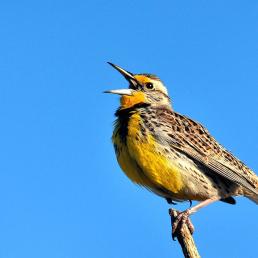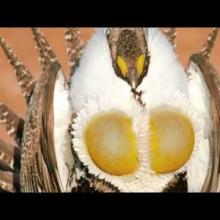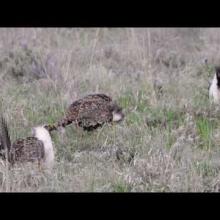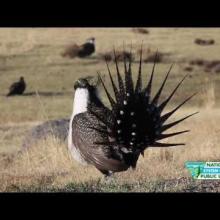

Join BirdNote tomorrow, November 30th!
Illustrator David Sibley and actor H. Jon Benjamin will face off in the bird illustration battle of the century during BirdNote's Year-end Celebration and Auction!
During winter, the Greater Sage-Grouse is wholly reliant on its namesake species — sagebrush — for both shelter and for food. Scientists call this bird "sagebrush obligate," meaning it needs this plant to survive. In the spring, its diet shifts to insects and plants, as it gets ready for the most fantastic mating show in the west — the lekking season.
BirdNote®
Of Grouse and Gizzards
- Greater Sage-Grouse
Written by Monica Gokey
This is BirdNote.
[sounds of blowing wind]
Winter has set in across North America’s vast sagebrush sea. For the Greater Sage-Grouse, it’s time to hunker down.
This iconic North American bird is perhaps best known for its elaborate mating display. Males inflate their chests, fan out their tail feathers, and vie for females’ attention with a spectacular dance.
[Sound of male sage-grouse call on lekking ground, ooo-OOO-ooooof… then wind picks up again.]
But winter is a quieter show. During winter, the sage-grouse is wholly reliant on its namesake species: sagebrush. Both for shelter and for food.
You see, most grouse species eat small rocks and stones and store them in a muscular part of their stomach known as the gizzard. When the gizzard contracts, the roughage helps the grouse grind up its food.
But sage-grouse don’t have a muscular gizzard, and they don’t pick up stones. So without the ability to grind up nutritious hard things, like seeds, sage-grouse depend on the soft, delicate leaves of sagebrush plants as a key food source to survive the long, cold winter. That makes these birds something scientists call sagebrush obligate. They need this plant to survive.
When the veil of winter finally lifts, sagebrush will no longer be the only thing on the menu for the Greater Sage-Grouse. In the spring, its diet shifts to insects and plants, as it gets ready for the most fantastic mating show in the west — the lekking season.
[male lekking sounds, mating call]
For BirdNote, I’m Mary McCann.
###
Senior Producer: Mark Bramhill
Producer: Sam Johnson
Managing Editor: Jazzi Johnson
Content Director: Jonese Franklin
Bird sounds provided by The Macaulay Library of Natural Sounds at the Cornell Lab of Ornithology, Ithaca, New York. Recorded by GRSG 50119 G Keller.
BirdNote’s theme composed and played by Nancy Rumbel and John Kessler.
© 2019 Tune In to Nature.org January 2019 / 2025 December 2022
Narrator: Mary McCann
ID# GRSG-02-2019-01-29 GRSG-02






